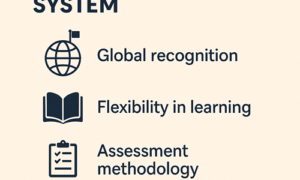
What exactly is IELTS?
The International English Language Testing System (IELTS) is meant to assist you in working, studying, or migrating to a country where English is the primary language. This covers Australia, Canada, New Zealand, the United Kingdom, and the United States.
During the test, your abilities to listen, read, write, and communicate in English will be evaluated. The IELTS exam is considered on a scale of 1-9.
Why should you take IELTS?
Those who wish to work, reside, or study in an English-speaking country must demonstrate a high level of English language proficiency. With 379 million speakers globally, English is the third most spoken language globally.
The ability to speak in the local language of the nation in which you intend to work or study offers several advantages. It is also necessary for employment possibilities and community inclusion.
IELTS is the most popular test for people who want to go to Australia, Canada, New Zealand, or the United Kingdom. It is acknowledged by over 11,000 businesses, colleges, schools, and immigration organizations worldwide, including 3,400 institutions in the United States.
The British Council, IDP: IELTS Australia, and Cambridge Assessment English jointly own IELTS. Suppose you are from Nagpur and wish to go to an English-speaking country for studies or work. Then joining the best IELTS coaching in Nagpur is the best approach to prepare for IELTS.
The IELTS Reading section follows the Listening segment and is the second element of the IELTS test. You’ll have 60 minutes to read three lengthy paragraphs and respond to 40 questions.
The IELTS Reading part is tough because you must grasp a huge quantity of content and properly answer questions about what you read in a short amount of time.
This is especially true during the Academic Reading section of the exam when you will be confronted with more challenging literature. Here are some 10 study ideas to help you ace the IELTS Reading part!
- Read as many different types of English texts as possible
Reading as much as possible is one of the greatest strategies to enhance your reading comprehension. Try to read as much English as possible, including novels, newspaper articles, online publications, academic materials, and even social media. Exposure to a wide range of written information will help you develop your reading abilities and expand your vocabulary.
Your reading speed will also increase, giving you an advantage while taking the real test. Remember that your time on the test will be restricted, so reading questions quickly will save you crucial seconds.
- Don’t rely just on reading as a study method
It’s wonderful to be a voracious reader. Unfortunately, reading a lot of literature can only go you so far in preparing for the IELTS exam. The Reading portion is intended to assess your ability to recognize key information.
You won’t be entirely prepared for the Reading portion unless you analyze everything you read attentively.
Creating questions for oneself is a useful activity. Find and read an article that interests you. Take notes on what you believe to be the most significant information as you go.
After that, formulate one or two questions (in the IELTS Reading style) on the article you read. This will assist you in developing a successful mentality.
- Study Unfamiliar Phrases
Make a practice of marking perplexing words or phrases as you read different materials. Then make an effort to understand what they imply. This can assist you in avoiding encountering a term you don’t identify during the real test.
- Read the Questions First Before Reading
In the Reading Section Passages, read the questions first. Knowing the questions ahead of time will help you understand what to look for while reading because they are directly related to the passages.
Please return to the questions and re-read them after you’ve finished reading the passage the first time. This will assist you in determining which areas of the text require your undivided attention.
- Remember that spelling is important
If you spell your response improperly, it will be marked incorrect. The good news is that you don’t lose points for wrong answers, so if you’re not sure how to spell a word, try your hardest anyhow. You could be correct!
- Don’t fall victim to traps
As previously said, the Reading part focuses on reading a book and recognizing significant information. Assume you followed our advice and read the questions before the text. Then you notice a term in the text that you saw in one of the questions. That has to be the solution.
The Reading component is designed to assess your reading comprehension, including paying attention. Some questions are meant to lead you astray by teaching you to believe they have obvious solutions. Always re-read your replies to ensure that they are answering the question correctly. Don’t be caught in a trap!
- Diagrams with Labels
You may be asked to label a diagram during the Reading test. The good news is that the words you require may be found in the text. As previously said, spelling is important, so make sure to copy any words you need precisely.
- Emphasise Important Information
The Reading portion requires you to digest a large quantity of information in a short period. Underline and circle essential words and sentences as you go to make things easier for yourself.
- Distribute Your Time Equitably Between Passages
The Reading test requires you to respond to questions based on three distinct texts. It is suggested that you spend 20 minutes on each passage. This may not appear to be a lot of time to dedicate to a single text, but keep in mind that you only have one hour to finish the Reading part.
You’ll have the highest chance of overall success if you divide your time evenly across the three chapters. Just keep an eye on the clock; you don’t want to end up with only 10 minutes to spend on the last segment.
- A Few Other Points to Remember
Because you don’t lose points for incorrect replies, never leave a blank spot. Take notes on your question paper, but keep in mind that only your answer sheet will be graded. Remember to bring an eraser because you’ll be writing in pencil. You can use “T” or “F” for True or False in the True/False questions. Questions aren’t always linear, which means the process of answering them doesn’t always have a clear beginning and endpoint.
Conclusion
The International English Language Testing System (IELTS) is designed to help you work, study, or relocate to a country where English is the predominant language. Australia, Canada, New Zealand, the United Kingdom, and the United States are included.
Assume you are from Nagpur and want to study or work in an English-speaking nation. Then enrolling in the top IELTS tutoring in Nagpur is the ideal way to prepare for the IELTS.
The IELTS Reading portion comes after the Listening section and is the second component of the IELTS exam. You’ll have 60 minutes to read three long paragraphs and answer 40 questions.
The IELTS Reading section is difficult because you must comprehend a large amount of information and correctly answer questions about what you read in a short amount of time.






